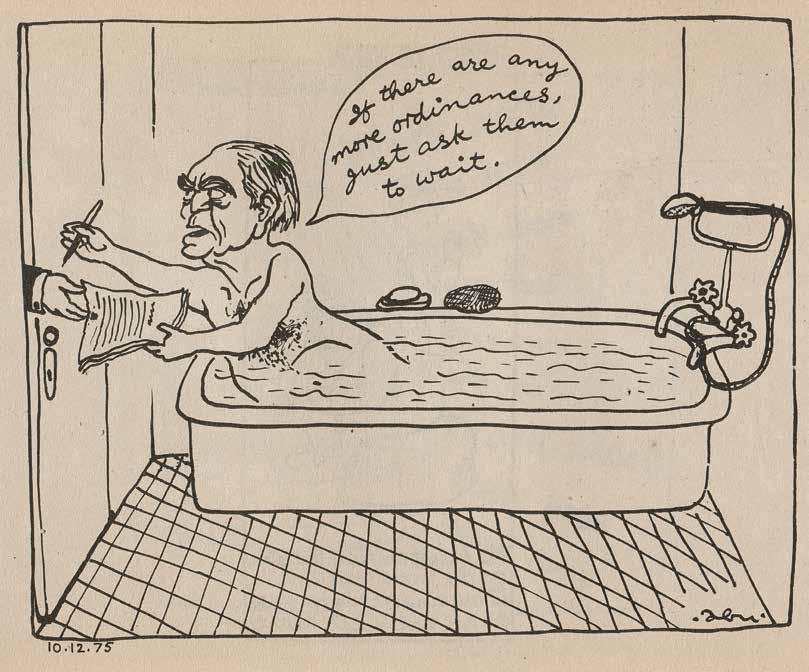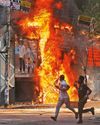
AMONG the many delicious ironies that permeate our public life was the recent decision of the National DemocraticAlliance (NDA) government led by the Bharatiya Janata Party (BJP) to officially commemorate the Indian Emergency of 1975-77 as "Samvidhan Hatya Diwas" (Constitution Murder Day). The irony is particularly rich since the Emergency gave the Hindu Right-then represented by the Jana Sangh-and its storm troopers, the Rashtriya Swayamsevak Sangh (RSS), a chance to wash off the stubborn stains of the assassination of M K Gandhi. By serving jail time, the Jana Sangh also made up for the significant absence of the Hindu Right in India's freedom struggle. By being banned, once more since 1948, the RSS was able to rehabilitate itself as an oppositional force to the Congress. Many who were jailed for just a month or more were able to claim, thereafter, fat 'Emergency pensions' in some BJP-ruled states of the Indian Union. No such fortune was bestowed on the members of the Jamaat-e-Islami Hind, which was also banned.
The irony is deepened further by the fact that the 21-month suspension of democratic rights and freedoms, a first in Independent India, was a mere baby step compared to what would become, as Arvind Narrain's detailed analysis has it, 'India's Undeclared Emergency' since 2014. Was the Emergency, then, just a forerunner of what an authoritarian state could achieve? Or does the dramatic backsliding of democracy of the past decade cast a rosier light on the earlier short stint?
هذه القصة مأخوذة من طبعة October 01, 2024 من Outlook.
ابدأ النسخة التجريبية المجانية من Magzter GOLD لمدة 7 أيام للوصول إلى آلاف القصص المتميزة المنسقة وأكثر من 9,000 مجلة وصحيفة.
بالفعل مشترك ? تسجيل الدخول
هذه القصة مأخوذة من طبعة October 01, 2024 من Outlook.
ابدأ النسخة التجريبية المجانية من Magzter GOLD لمدة 7 أيام للوصول إلى آلاف القصص المتميزة المنسقة وأكثر من 9,000 مجلة وصحيفة.
بالفعل مشترك? تسجيل الدخول

Nomadland
All eyes are on President-elect Donald Trump and his policy on immigration

Far from Home
We have forgotten the plight of Afghans who fled to India, and continue to suffer

Bang Bang That Awful Sound
What happens when we listen closely to the soundscape of war?

Refugee Dilemma
For most Indian-origin Sri Lankan Tamils, who are victims of ethnic conflict and civil war, proving that they are not illegal migrants is a nearly impossible task

They Poured Fire on Us
The resilience of refugee women from Sudan, Ethiopia and Yemen in the face of war and displacement is remarkable

The Sound and the Fury
Iraqi poet, novelist, translator and scholar Sinan Antoon was born and raised in Baghdad.

The Day I Became a Woman
In a country where authorities have been directly engaging in the gruesome war against women for decades, artists like Nahid Hassanzadeh stand apart as a voice of dissent–a haunting reminder of the unwavering spirit of the rebellious Iranian women fighting against the Islamic Republic’s violent crackdown.

The Kite Runner
The official figure of civilian deaths in Afghanistan is a serious underestimate. It is unlikely that we will ever know the real cost of Afghan lives

American Patriot
Barring a few exceptions, Hollywood movies continue to be gung-ho about the United States' penchant for waging wars across the globe

The Hunters
How can Bangladesh's fractured society, burdened by layers of trauma, begin to heal?